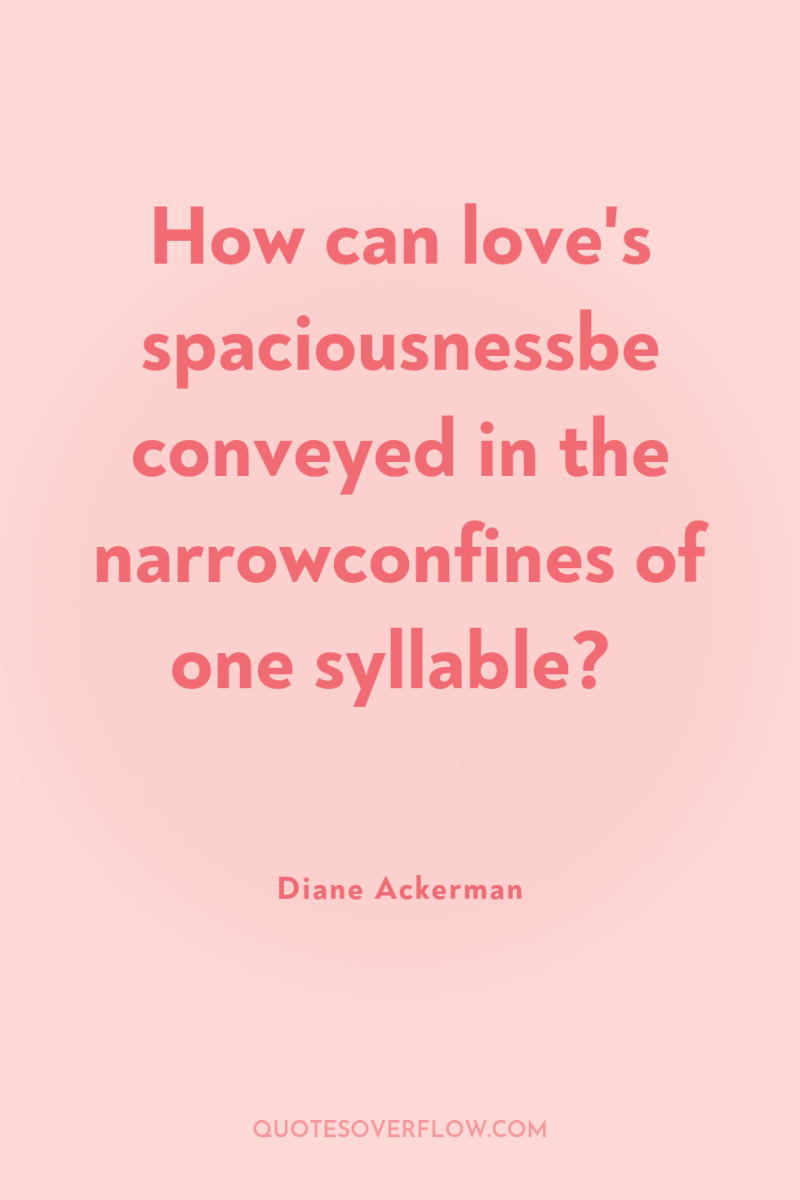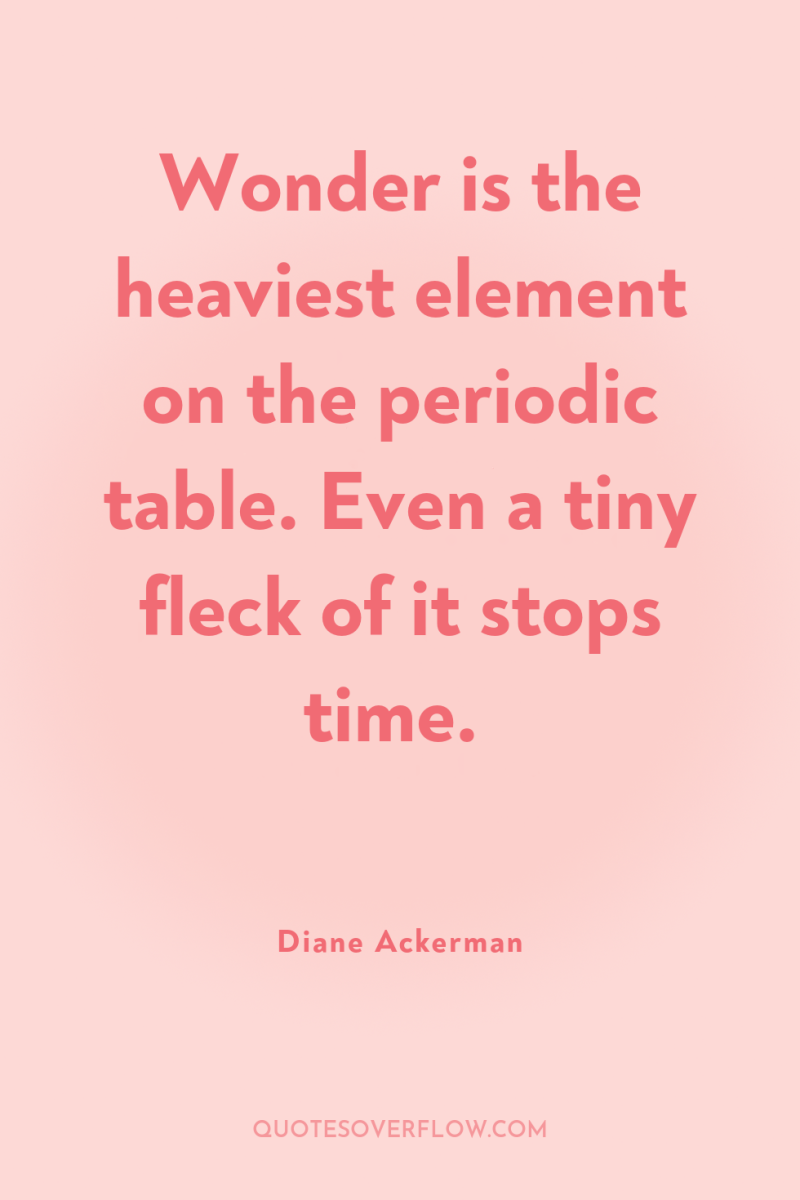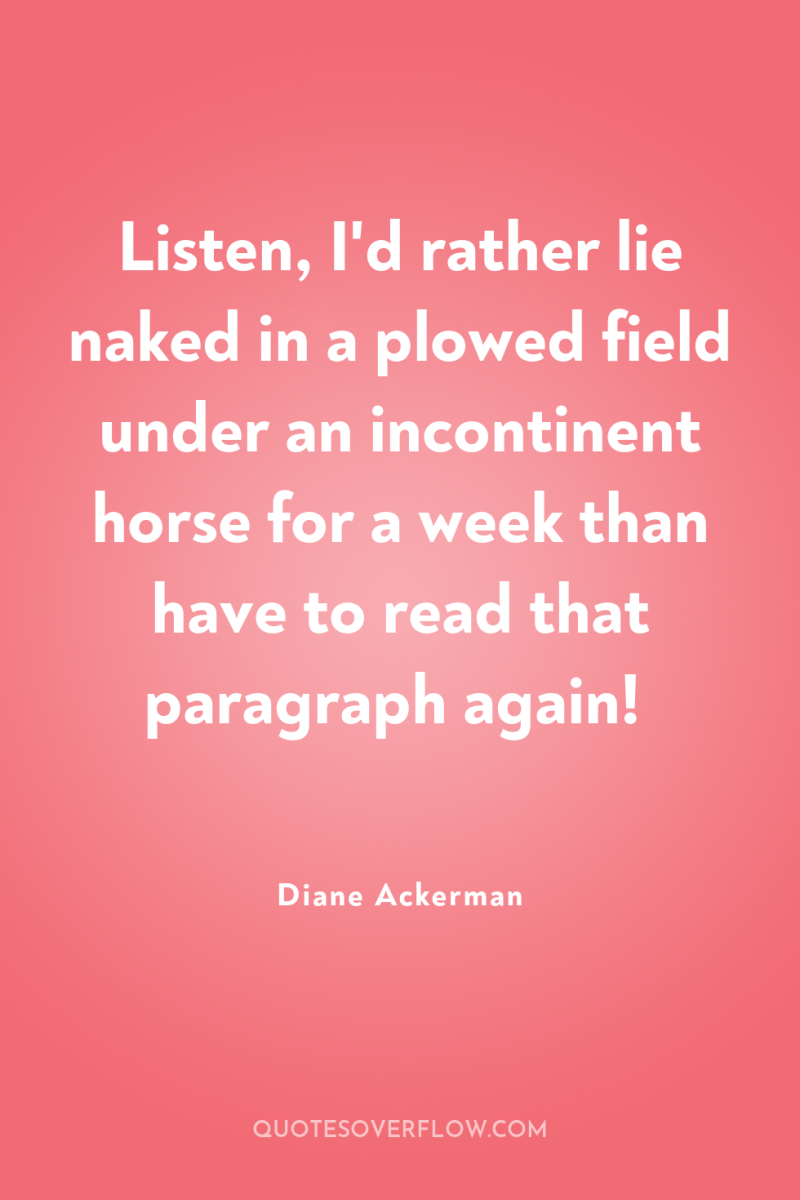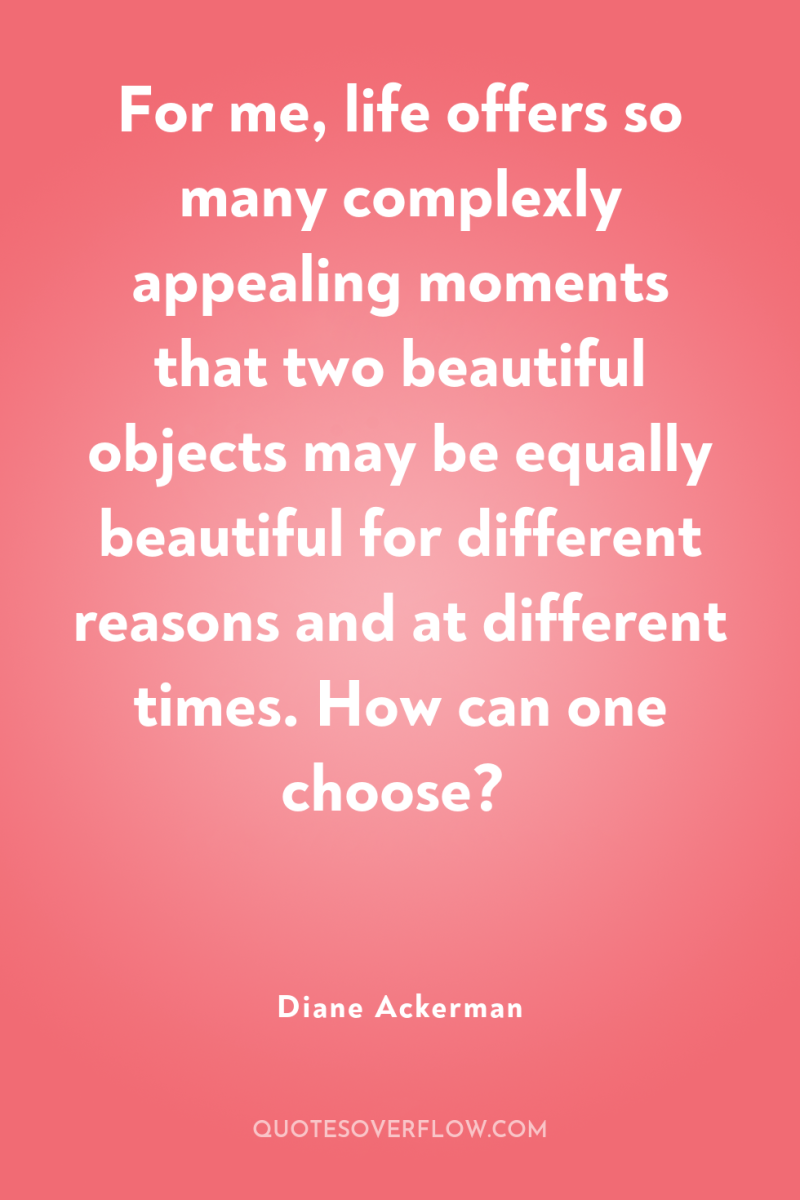1
I'd suffered many losses in recent years after my father mother uncle aunt and cousin had all passed away. In her final years my mother often lamented that there was no one alive who had known her as a girl and I was starting to understand how spooked she'd felt. I wasn't sure I could take any more abandonments. One succumbs so easily to mind spasms, worry spasms. [p. 95]Diane Ackerman

2
How can love's spaciousnessbe conveyed in the narrowconfines of one syllable?Diane Ackerman

3
Wonder is the heaviest element on the periodic table. Even a tiny fleck of it stops time.Diane Ackerman

4
Listen, I'd rather lie naked in a plowed field under an incontinent horse for a week than have to read that paragraph again!Diane Ackerman
5
I'm an Earth ecstatic, and my creed is simple: All life is sacred, life loves life, and we are capable of improving our behavior toward one another. As basic as that is, for me it's also tonic and deeply spiritual, glorifying the smallest life-form and embracing the most distant stars.Diane Ackerman
6
At some point, one asks, "Toward what end is my life lived?" A great freedom comes from being able to answer that question. A sleeper can be decoyed out of bed by the sheer beauty of dawn on the open seas. Part of my job, as I see it, is to allow that to happen. Sleepers like me need at some point to rise and take their turn on morning watch for the sake of the planet, but also for their own sake, for the enrichment of their lives. From the deserts of Namibia to the razor-backed Himalayas, there are wonderful creatures that have roamed the Earth much longer than we, creatures that not only are worthy of our respect but could teach us about ourselves.Diane Ackerman

7
For me, life offers so many complexly appealing moments that two beautiful objects may be equally beautiful for different reasons and at different times. How can one choose?Diane Ackerman
8
I may enter a zone of transcendence, in which I marvel at all the accidents of fate, since the beginning of life on earth, that led to my genes being created and my standing in this particular garden in a contemplative and imagining mind. I’ve been reading recently how reflection evolved. what a fascinating solution to the rigors of survival…how amazing that a few basic ingredients- the same ones that form the mountains, plants, and rivers- when arranged differently and stressed could result in us. More and more of late, I find myself standing outside of life, with a sense of the human saga laid out before me. it is a private vision, balanced between youth and old age, a vision in which I understand how caught up in striving we humans get, and a little of why, and how difficult it is even to recognize, since it feels integral to our nature and is. but I find it interesting that, according to many religions, life and begins and ends in a garden.Diane Ackerman
9
Studies show that the IQ range of most creative people is surprisingly narrow, around 120 to 130. Higher IQs can perform certain kinds of tasks better--logic, feats of memory, and so on. But if the IQ is much higher or lower than that, the window of creativity closes. Nonetheless, for some reason we believe more is better, so people yearn for tip-top IQs, and that calls for bigger memories. A fast, retentive memory is handy, but no skeleton key for survival.Diane Ackerman
10
Who would deduce the dragonfly from the larva, the iris from the bud, the lawyer from the infant? ...We are all shape-shifters and magical reinventors. Life is really a plural noun, a caravan of selves.Diane Ackerman
11
Symbolic of life, hair bolts from our head[s]. Like the earth, it can be harvested, but it will rise again. We can change its color and texture when the mood strikes us, but in time it will return to its original form, just as Nature will in time turn our precisely laid-out cities into a weed-way.Diane Ackerman
12
One morning as I closed the cyclone-fence gate / to begin a slow drift / down to the cookhouse on foot / (because my truck wheels were glued / in deep mud once again), / I walked straight into / the waiting non-arms of a snake, / its tan beaded-bag skin / studded with black diamonds. Up it coiled to speak to me a eye level. / Imagine! that sleek finger / rising out of the land's palm / and coiling faster than a Hindu rope. / The thrill of a bull snake / startled in the morning / when the mesas lie pooled / in a custard of light / kept me bright than ball lightning all day. Praise leapt first to mind / before flight or danger, / praise that knows no half-truth, and pardons all.Diane Ackerman
13
Devising a vocabulary for gardening is like devising a vocabulary for sex. There are the correct Latin names, but most people invent euphemisms. Those who refer to plants by Latin name are considered more expert, if a little pedantic.Diane Ackerman
14
Alligators have beautiful undulating skin, which feels dense, spongy, solid, like the best eraser.Diane Ackerman
15
Couples are jigsaw puzzles that hang together by touching in just enough points. They're never total fits or misfits.... We marry children who have grown up and still rejoice in being children. ... [p. 15]Diane Ackerman
16
For if I do something, I never do it thoughtlessly.Diane Ackerman
17
Anticipating their calamity and fright when deportation day came (August 6, 1942) he [Henryk Goldszmit, pen name: Janusz Korczak] joined them aboard the train bound for Treblinka, because, he said, he knew his presence would calm them–“ You do not leave a sick child in the night, and you do not leave children at a time like this.” A photograph taken at the Umschlagplatz (Transshipment Square) shows him marching, hatless, in military boots, hand in hand with several children, while 192 other children and ten staff members follow, four abreast, escorted by German soldiers. Korczak and the children boarded red boxcars not much larger than chicken coops, usually stuffed with seventy-five vertical adults, though all the children easily fit. In Joshua Perle’s eyewitness account in The Destruction of the Warsaw Ghetto, he describes the scene: “A miracle occurred, two hundred pure souls, condemned to death, did not weep. Not one of them ran away. None tried to hide. Like stricken swallows they clung to their teacher and mentor, to their father and brother, Janusz Korczak.”In 1971, the Russians named a newly discovered asteroid after him, 2163 Korczak, but maybe they should have named it Ro, the planet he dreamed of. The Poles claim Korczak as a martyr, and the Israelis revere him as one of the Thirty-Six Just Men, whose pure souls make possible the world’s salvation. According to Jewish legend, these few, through their good hearts and good deeds, keep the too-wicked world from being destroyed. For their sake alone, all of humanity is spared. The legend tells that they are ordinary people, not flawless or magical, and that most of them remain unrecognized throughout their lives, while they choose to perpetuate goodness, even in the midst of inferno. .Diane Ackerman
18
Love is the great intangible. In our nightmares, we can create beasts out of pure emotion. Hate stalks the streets with dripping fangs, fear flies down narrow alleyways on leather wings, and jealousy spins sticky webs across the sky. In daydreams, we can maneuver with poise, foiling an opponent, scoring high on fields of glory while crowds cheer, cutting fast to the heart of an adventure. But what dream state is love? Frantic and serene, vigilant and calm, wrung-out and fortified, explosive and sedate —love commands a vast army of moods. Hoping for victory, limping from the latest skirmish, lovers enter the arena once again. Sitting still, we are as daring as gladiators. .Diane Ackerman
19
It began in mystery and it will end in mystery, but what a rare and beautiful country lies in between.Diane Ackerman
20
I was moving in a narrow range between busy distractedness and a pervasive sadness whose granules seemed to enter each cell, weighing it down... I ghosted between islands of anxiety... a fatigue that dulled my zest, decanted it. Sorrow felt like a marble coat I couldn’t shed.Diane Ackerman
21
When I set a glass prism on a windowsill and allow the sun to flood through it, a spectrum of colors dances on the floor. What we call "white" is a rainbow of colored rays packed into a small space. The prism sets them free. Love is the white light of emotion.Diane Ackerman
22
Europe enjoyed a heritage of fairy tales alive with talking animals--some almost real, other deliciously bogus-- to spark child's fantasies and gallop grownups to the cherished haunts of childhood. It pleased Antonina that her zoo offered on orient of fabled creatures, where book pages sprang alive and people could parley with ferocious animals.Diane Ackerman
23
Suffering took hold of me like a magic spell abolishing all differences between friends and strangers.Diane Ackerman
24
It began in mystery, and it will end in mystery, but what a savage and beautiful country lies in between.Diane Ackerman
25
I believe consciousness is brazenly physical, a raucous mirage the brain creates to help us survive. But I also sense the universe is magical, greater than the sum of its parts, which I don't attribute to a governing god, but simply to the surprising, ecstatic, frightening everyday reality we all know. Ultimately, I find consciousness a fascinating predicament for matter to get into.Diane Ackerman
26
Metaphor isn't just decorative language. If it were, it wouldn't scare us so much. Colorful language threatens some people, who associate it, I think, with a kind of eroticism (playing with language in public = playing with yourself), and with extra expense (having to sense or feel more). I don't share that opinion. Why reduce life to a monotone? Is that truer to the experience of being alive? I don't think so. It robs us of life's many textures. Language provides an abundance of words to keep us company on our travels. But we're losing words at a reckless pace, the national vocabulary is shrinking. Most Americans use only several hundred words or so. Frugality has its place, but not in the larder of language. We rely on words to help us detail how we feel, what we once felt, what we can feel. When the blood drains out of language, one's experience of life weakens and grows pale. It's not simply a dumbing down, but a numbing.Diane Ackerman
27
We tend to think of memories as monuments we once forged and may find intact beneath the weedy growth of years. But, in a real sense, memories are tied to and describe the present. Formed in an idiosyncratic way when they happened, they're also true to the moment of recall, including how you feel, all you've experienced, and new values, passions, and vulnerability. One never steps into the same stream of consciousness twice. .Diane Ackerman
28
Still, though no one is an island, most are peninsulas. Our lives wouldn't make sense without personal memories pinned like butterflies against the velvet backdrop of social history.Diane Ackerman
29
In our heart we know that life loves life. Yet we feast on some of the other life-forms with which we share our planet; we kill to live. Taste is what carries us across that rocky moral terrain, what makes the horror palatable, and the paradox we could not defend by reason melts into a jungle of sweet temptations.Diane Ackerman
30
Frantic and serene, vigilant and calm, wrung-out and fortified, explosive and sedate–love commands a vast army of moods. Hoping for victory, limping from the latest skirmish, lovers enter the arena once again. Sitting still, we are as daring as gladiators.Diane Ackerman
31
Why was it, she asked herself, that "animals can sometimes subdue their predatory ways in only a few months, while humans, despite centuries of refinement, can quickly grow more savage than any beast?Diane Ackerman
32
As fleeting emotions stalk it, a face can leak fear or the guilt of a forming lie.Diane Ackerman
33
Much more. We're joined at the heart."" Bad luck for you, I'm afraid. My ticker's pretty wonky."" Too much boozing." His eyes twinkled, and he drew me close. "Not enough kissling.Diane Ackerman
34
The faint pink coating the treetops promised rippling buds, a sure sign of spring hastening in, right on schedule, and the animal world getting ready for its fiesta of courting and mating, dueling and dancing, suckling and grubbing, costume-making and shedding-in short, the fuzzy, fizzy hoopla of life's ramshackle return.Diane Ackerman
35
The sensory misers will inherit the earth, but first they will make it not worth living on. When you consider something like death, after which we may well go out like a candle flame, then it probably won’t matter if we try too hard, are awkward sometimes, care for one another too deeply, are excessively curious about nature, are too open to experience, enjoy a nonstop expense of the senses in an effort to know life intimately and lovingly.Diane Ackerman
36
Knee-deep in the cosmic overwhelm, I’m strickenby the ricochet wonder of it all: the plaineverythingness of everything, in cahootswith the everythingness of everything else.- From Diffraction (for Carl Sagan)Diane Ackerman
37
I don't want to get to the end of my life and find that I lived just the length of it. I want to have lived the width of it as well.Diane Ackerman
38
We live on the leash of our senses.Diane Ackerman
39
I don't want to be a passenger in my own life.Diane Ackerman
40
Touch seems to be as essential as sunlight.Diane Ackerman
41
Nothing is more memorable than a smell. One scent can be unexpected, momentary and fleeting, yet conjure up a childhood summer beside a lake in the mountains.Diane Ackerman
42
Hurricane season brings a humbling reminder that, despite our technologies, most of nature remains unpredictable.Diane Ackerman
43
Artificial intelligence is growing up fast, as are robots whose facial expressions can elicit empathy and make your mirror neurons quiver.Diane Ackerman
44
Love is the best school, but the tuition is high and the homework can be painful.Diane Ackerman
45
I'm fascinated how often and with what whole-heartedness people will risk their lives to perform acts of courage, sacrifice, and compassion for total strangers.Diane Ackerman
46
Living with anyone for many years takes skill. To keep peace in the household, couples learn to adapt to one another, hopefully in positive ways.Diane Ackerman
47
We ogle plants and animals up close on television, the Internet and in the movies. We may not worship the animals we see, but we still regard them as necessary physical and spiritual companions. Technological nature can't completely satisfy that yearning.Diane Ackerman
48
Even without seeing the crickets, grasshoppers, cicadas and katydids, we hear them shrilling in this season and trust that they're the tiny living gargoyles entomologists claim.Diane Ackerman
49
All relationships change the brain - but most important are the intimate bonds that foster or fail us, altering the delicate circuits that shape memories, emotions and that ultimate souvenir, the self.Diane Ackerman
50
I've always loved scuba diving and the cell-tickling feel of being underwater, though it poses unique frustrations. Alone, but with others, you may share the same sights and feelings, but you can't communicate well.Diane Ackerman